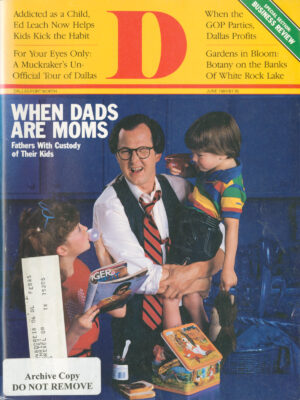BY THE TIME these words see print, the race for the Democratic presidential nomination will be over. Sure, there’ll be fireworks in San Francisco next month. Gary Hart will not go down without a fight, and Jesse Jackson will try to play kingmaker. Delegates are unbound this year, and some will no doubt vote their consciences, causing last-minute flutters of Walter Mondale’s pulse.
But the Democrats always put on a good show. When the smoke clears, Mondale will be the nominee, even if Gary Hart takes California this month. Barring a miracle- or the discovery of a slogan as powerfully meaningless as “Where’s the Beef?’-Hart’s new ideas will seem as dated in July as last year’s sitcoms.
“Gary, we hardly know you,” many voters said to the Hart candidacy, opting for the more predictable Mondale. Perhaps Hamlet put it best: “Rather bear those ills we have than fly to others we know not of.” Hart admitted that many of his ideas were untested and might not work, thus violating Hypocritical Requirement No. 1 of the American electorate: “Thou shalt behave as if perfect. Never doubt thyself. We are weak and groping; you must lead us out of the wilderness.”
At least with Mondale, we need not worry about the threat of new ideas-or any ideas, for that matter. The thought of this quintessential plodder flirting with ideas is simply absurd. We just might as soon imagine Pete Rose reading Proust. Picture the scene in the Mondale camp the night after Hart’s surprise victory in New Hampshire, when it became apparent that the road to San Francisco would not be a Cakewalk.
“Ideas? Ideas?” Fritz might have spluttered. “Hey, what is this? I’ve got the endorsements of every special-interest group from the Alliance for the Albacore to Zero Population Growth. I’ve promised that everybody will have a fair and equitable share of everything because that is the solid, bedrock promise of the Democratic Prty from the days of Franklin Delano Roosevelt [waves arms, voice rising] and that is my promise to you today! [Remembers himself, calms down.] Damn it, I’ve paid my dues. When I was nominated to the Senate-and that’s almost like being elected-I went. When Carter called, I went. Now labor is calling, and I’m ready. And they want ideas?”
Democrats have been the “out” party for 12 of the past 16 years. During that time, they have sung a fairly constant refrain at election time: Anybody but him. Anybody but (fill in name of front-runner). In 1968, “Clean for Gene” McCarthyites and disgruntled supporters of the slain Bobby Kennedy sat on their hands, wanting anybody but Hubert Humphrey, who ran with the albatross of the Chicago Convention around his neck. “The whole world’s watching!” chanted the hippies and yippies in the streets of Chicago, and they were right. Result: Richard Nixon by a whisker, with an assist to George Wallace, whose siren song of racism and bureaucracy-busting lured away 13 percent of the voters.
By 1972, defectors from the Democrats were generally older and far more numerous. George McGovern was left holding only the tattered left fringe of the party. Result: Nixon by a landslide.
After Watergate and the brief stewardship of Gerald Ford, the country was ready to give the Democrats another chance. In 1976, for perhaps the last time, the traditional Democratic coalition of blacks, urban ethnics, blue-collar workers and the Solid South held firm to give Jimmy Carter the victory.
The rest is recent history. Inflation. Carter’s “spiritual malaise.” The Ayatollah. Then Reagan, perhaps the most doctrinaire conservative ever to occupy the White House.
And now, 1984. We whine and breast-beat and talk about how we deserve better candidates (a curious proposition), but in the end we must choose-not from Jefferson, Lincoln, Solomon and Gandhi, but between Walter Mondale and Ronald Reagan. Or, if the convention goes wild, between Gary Hart and Ronald Reagan.
The choice is one to pain a thinking person. Consider the candidates:
Walter Mondale is proud to be the willing tool of special interest groups such as Big Labor, which too often is wedded to the dying industries of the past and cries out for protection; and Big Education, the teachers’ lobbies that fight long-needed reforms like those of the Perot Commission. Give them tenure or give them death, and if the schools collapse into holding pens for mediocrities, so be it. Mondale, the panderer to anyone with a bloc of votes to deliver. Mondale, who, in his panic after Hart’s first charge, began attacking him from the right and the left. For a hilarious moment, there was Fritz Mondale making hawk noises at Hart in the South, accusing him of being soft on the Commies in Central America. Coming from a man with Mondale’s record on defense, this should be taken as proof that he will make any speech, blur any distinction to become president.
And what of “Where’s the Beef?” Is there some Dantean circle of hell set aside for politicians who further trivialize our political discourse? The damage done to the fragile neurons of the electorate can hardly be estimated. JFK quoted Robert Frost and Jefferson. Hart reads William Kennedy. Fritz scores big with burger talk. Give me stonewall, limited full disclosure, this point in time and the other linguistic crimes of the Nixon gang, but not this. A century from now, will historians note that the leadership of the free world was determined by a hamburger slogan-and a bad one at that?
As for Reagan, let us turn to his autobiography, Where’s the Rest of Me?, for some astonishing insights into the Reagan world view. Like most conservative Republicans, he is the sworn enemy of the welfare state. He trumpets the virtues of self-reliance, rugged individualism and making your own way without a handout. In the autobiography, Reagan claims to have saved the lives of 77 people during the summers he worked as a lifeguard, which surely must be some kind of record. And what did Reagan learn from those rescues? Why, that people just do not like to be helped. “They felt insulted,” he writes. “Almost every one of them later sought me out and angrily denounced me for dragging them to shore.” Reagan goes on to explain that such early experiences helped to make him a conservative.
It’s staggering to think that a major world leader owes much of his credo to such fantasies. First, does it seem plausible that these people would rather have been left alone to drown? And second, even assuming that this story is true and not just more of the Reagan anecdotage, can the reactions of panic-stricken people on a beach, many no doubt confused and humiliated, form the basis for a president’s political behavior?
The Great Communicator has other liabilities. There’s his flirtation-no, his marriage -with the New Right/Moral Majority crowd. For a while, Reagan played down his ties to the Falwellians (much to their anguish), but when the school prayer mess hit the Senate floor, there was Reagan fighting tooth and nail for this purely symbolic gesture. Does Reagan-does anyone- think that the moral fiber of this country will be significantly strengthened if school children close their eyes for 30 seconds a day while listening to a prayer that is either a) so blandly non-denominational as to be little more than a plea for general niceness, or b) offensive to Jews, Catholics, Buddhists, atheists, Protestants or whoever is in the minority in that particular school? With the school system in decline and semi-literacy rampant, Reagan’s obsession with Prayer Now is a classic case of bad timing.
And note the timing of Reagan’s China trip. In 1978, he had this to say in a radio speech about the Red Chinese: “The regime of Mao’s successors is still authoritarian and repressive, a statist monopoly founded on violence and propaganda and destructive of the humane traditions of the Chinese people themselves.” Reagan has every right to change his mind even if the Chinese haven’t changed their ways, but why in April, in the middle of an election year? Weren’t better relations with the Chinese important in 1981, 1982 and 1983? The China trip, so reminiscent of Nixon’s in 1972, was a transparent political maneuver designed to show Reagan above the fray, out improving the world while the Democrats fought like cats in a bag. And as for Reagan’s long-held belief that the United States sold out the non-Communist Chinese of Taiwan by recognizing Red China-well, our memories are short.
Gary Hart presents a special problem. Many voters shunned him in the primaries because he was an unknown quantity (just as many loved him for that very reason); or because he had changed his name, age and signature; or because he seemed to be little more than a media creation. As for the name, what should an ambitious young man in the early Sixties have done if he hoped to rise in public life? Change his name to Hart-penskowitz? The fudging on age shows mere vanity-hardly a rare vice in a politician- and the handwriting charge is too trivial to consider.
The “media creation” charge is, of course, correct, and Hart should have fronted the issue by going to the public (through the media), and saying that, yes, he was a media creation and the people should count themselves lucky that he was. Hart is far from the perfect candidate, but let us clear our minds of hypocrisy. A person running for president in a country of this size has exactly two ways to get his name in front of the voters: He can secure the backing of powerful, entrenched groups with vast resources (as Mondale has done), or he can get massive free exposure through the media. That’s it. While we were fretting about Hart’s blitz on the evening news, we might have considered the alternatives.
Hart has his flaws and his still-fuzzy identity, but his failure to stop the Mondale juggernaut says as much about the problems of our primary system as it does about his own shortcomings. Hart has written two books- Right from the Start: A Chronicle of the McGovern Campaign and A New Democracy. The latter does contain some provocative ideas about tax reform, employee participation in business, arms control, etc. But Hart is naive to say that voters should read his book in order to understand his positions. One of the most depressing “new ideas” of our time is that most people read very little beyond menus and billboards. So, one of the larger ironies of Campaign ’84: The candidate whose ideas-good, bad or borrowed-are most clearly outlined is viewed as an airhead short on beef.
Eugene McCarthy once said that an “issues” candidate is just a candidate who says “issues” a lot. In the baffling jumble of our political marathon, nobody has time to do much more than say they have new ideas. If Hart broke into prime time to explain his employment strategy (page 102, A New Democracy), 30 million fingers would punch to reruns of Three’s Company.
No, television is the arena now. Let Hart say something genuinely stupid on TV, as when he said that he would look into the windows of a foreign jetliner invading U.S. skies and would only shoot it down if the people inside were wearing uniforms, and his dumb remark lives forever to haunt him. Let him rethink his position on a minor issue like moving the U.S. Embassy in Israel from Tel Aviv to Jerusalem (what was your position on that one, by the way?), and Mondale lashes him for waffling on the issue-despite the fact that Hart, like Mondale, believes strongly in our commitment to the security of Israel.
In short, our political campaigns are barren ground for thought on the part of candidate or voter. Hart did us all a favor this year by postponing the inevitable and fostering the illusion of choice, but Mondale showed us how it’s really done. He touched all the bases and knelt to all the right potentates, proving that when it comes to winning the nomination, new ideas are not enough.
Related Articles

Dallas 500
Meet the Dallas 500: Mike Tomon, Co-President and COO of Legends Hospitality
The exec talks about Legends' long term partnership with Real Madrid, his leadership strategies, and the pet alligator he had in college.
By Ben Swanger

D CEO Award Programs
Winners Announced: D CEO’s Financial Executive Awards 2024
Honorees in this year’s program include leaders from o9 Solutions, Baylor Scott & White, and Texas Capital, as well as our Constantine ‘Connie’ Konstans Award winner Mahesh Shetty of ILE Homes.



